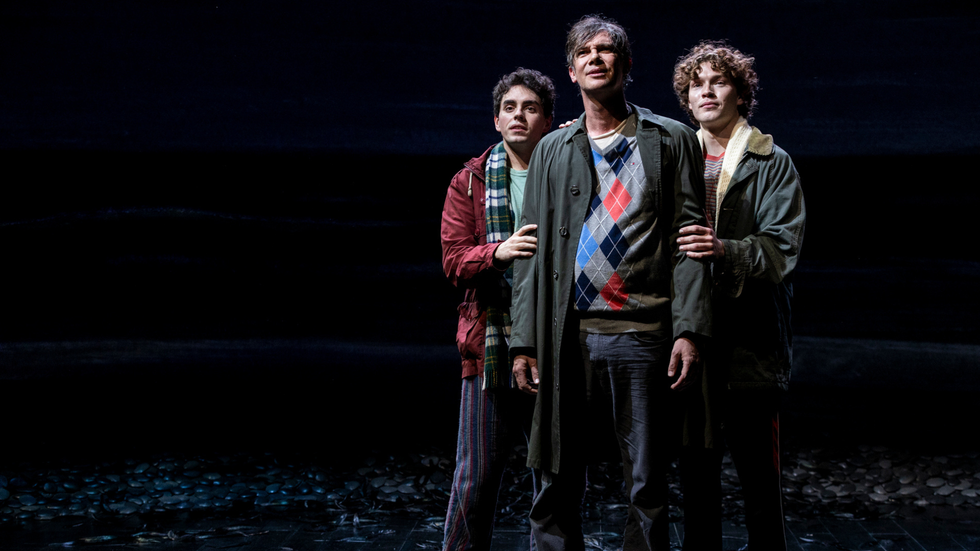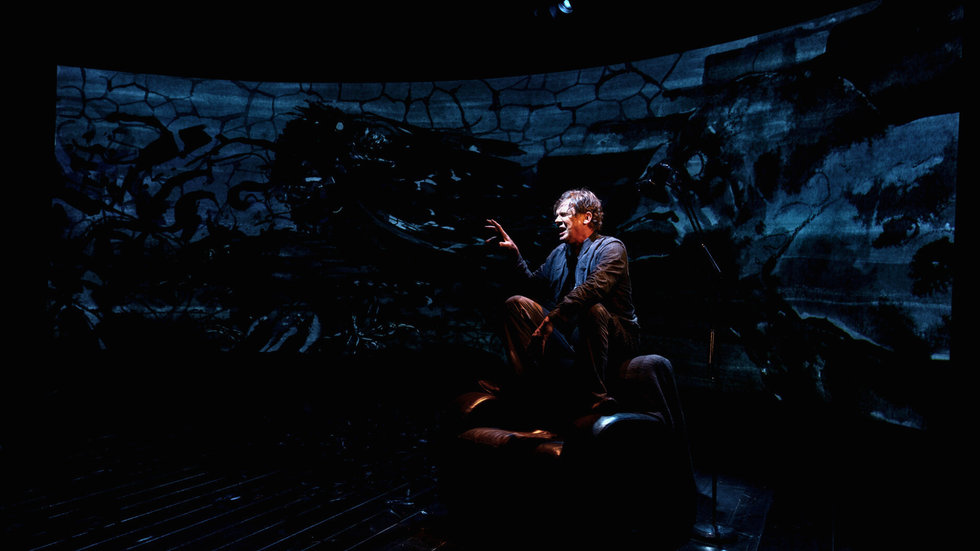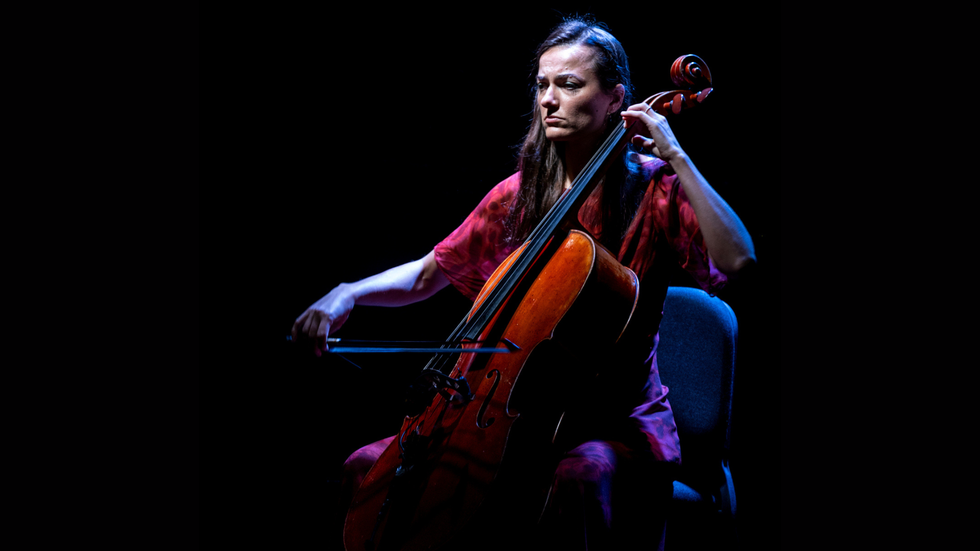Review
Grief is the Thing with Feathers
Belvoir St Theatre, Sydney
Rating: ★★★★☆
A standing ovation, tingling fingers, damp eyes and silent nods of appreciation are passed around the audience like a shared secret. Belvoir St Theatre’s production of Grief is the Thing with Feathers, currently playing in Sydney, takes audiences through an elegiac, profound exploration of grief. It immerses us in it, cradles us in its poetics and gently carries us through to the other side.
Max Porters’ best-selling novel of the same name has been adapted for the stage by director Simon Phillips, theatre designer Nick Schlieper and actor Toby Schmitz. The play follows a fragile father and his two young sons as they navigate a sudden, overwhelming grief.
They have lost their beloved mother and wife, the glue of the little family.
Dad, as he is known in the play, is a literary scholar studying Ted Hughes' poetry collection Crow, and when he is visited by an ambiguous avian figure, he finds himself detached from reality, blurring his understanding of reality and dream, conscious thought and subconscious feeling. Crow’s lengthy and haunting visits embody Dad’s experience of grief, resisting a linear understanding of how he processes the loss of his wife, as the unusual presence acts as his friend, storyteller, psychic, and therapist.

Porter’s debut novel Grief is the Thing with Feathers was published in 2015. It was inspired by the English writer's own experience with loss — his father died when he was young — and it is a lyrical portrayal of grieving. It was considered a risky project due to its unusual approach, but the novel received critical acclaim and Porter won the Sunday Times Young Writer of the Year Award in 2016.
Then in 2018, playwright Edna Walsh and theatre company Complicité produced the first stage adaptation, starring Cillian Murphy as Dad. Those audiences applauded the rawness and emotional depth of the performance, a similar reaction to that of Belvoir audiences.
In this fresh Sydney production, acclaimed Australian actor Toby Schmitz plays the roles of both Dad and Crow to great effect. From dialect to gestures to posture, every movement and breath captures a sense of truth and spontaneity in the characters.
[Schmitz's] ability to carry the story with conviction and care allows the audience to surrender to the intensity of the experience.
And while his performance is elevated by the technical and design elements of the show, he doesn’t depend on them to tell the story. Instead, the performance and the design work in harmony to deliver emotional impact.
The arrival of Crow in the first act is a stand out moment. A sudden downpour of black silky feathers, engulfing Dad in their forceful swirl and startling the audience. It signals the beginning of the family’s descent into chaos, grief and emotional unraveling. There isn’t a moment after this when the stage stands still or empty. Cluttered with objects, memories, movement, emotion, the space reflects the turmoil of the characters. It’s only at the very end of the play that stillness returns, when the stage is once again calm, bare, and peaceful.

Crow becomes an anchor for the audience, leading them through the story and the deep unspoken complexities of grief including the emptiness of sorrow, the weight of yearning, the warmth of love and the lightness of innocence. The play shows how unique grief is as an individual experience, just as in a shared experience. Crow's arrival completely transforms the atmosphere, amplifying these complexities and the chaos. He’s dark, funny, and tender all at once, particularly in his interactions with the children.
One of [Crow's] lines stays with me, namely: "I won’t leave until you don’t need me anymore."
Other reviewers have compared that line to those of characters like Mary Poppins and Nanny McPhee; like these characters, he’s a nurturing figure. And each time Crow announces, "once upon a time," the audience braces for another story that goes deeper into the experience of grief, but also closer to healing. This play doesn’t just portray grief: it unpacks grief, exposes it, sits with it, and relives it.
The performance is supported by a powerful cello performance by Freya Schack-Arnott, a bold and brilliant choice. The cello became a rhythmic element of Crow — dark, playful, and intense — shifting effortlessly between moods to mirror his volatile nature. The music is woven through the performance, which deepens the atmosphere of isolation established through lighting and design.

The performances of Schmitz and his sons, played by Philip Lynch and Fraser Morrison, are real and raw. The young boys’ innocence contrasts with the darkness of the themes explored. This is both confronting and poignant, particularly for anyone who has experienced similar loss at a young age.
By performing varied perspectives – that of the young boys, Dad and Crow – the audience is offered a layered portrayal of grief.
This will allow many people to connect with the story; whatever their experience is with grief, there is something in the story for everyone to hold on to.
Although the intention behind the play’s non-linear narrative is clear, this structure can occasionally lead to confusion and emotional detachment. The production embraces the poetic nature of Porter’s work but, at times, struggles to present it with enough clarity to fully engage the audience. The abrupt shifts may not appeal to everyone — some may find it too jumpy or difficult to follow. It raises the question: is the confusion designed to mirror grief’s disorienting nature, or has the production leaned too far into the figurative, losing its grip on the narrative within an otherwise realistic contemporary setting? This play demands you to pay close attention. With the moody lighting, the back wall projections, the music, and the heightened performances, it is immersive but could also be overwhelming for some.
Indeed, this isn’t a story to be understood literally. It resists clarity, defies a linear shape — and so does grief. The play did not offer easy answers or a neatly resolved character arc, because it knows that grief doesn’t work that way. Instead, it asks the audience to sit within it — to feel the disorientation, the weight, the absurdity, the moments of unexpected beauty in grief.
A powerful, thought-provoking night at the theatre.
Grief is the Thing with Feathers is at Belvoir St Theatre.
UPDATE: The performance run has been extended until August 29, 2025
This review was supported through UNSW's ARTS2126 Reviewing the Arts course.
Related stories
Olivia is currently completing a double degree in Arts and Media at UNSW, majoring in Theatre and Performance Studies, Indigenous Studies, and PR and Advertising. Passionate about inclusivity in the arts, she aspires to amplify diverse voices and provide visibility to important stories.






